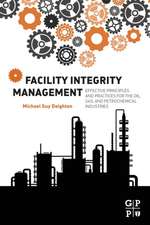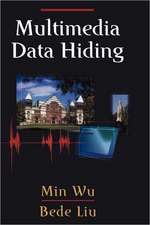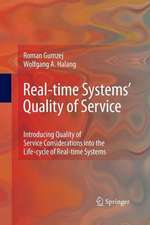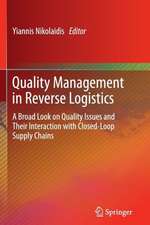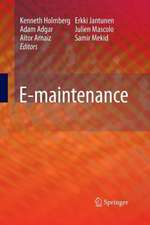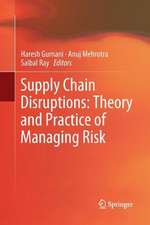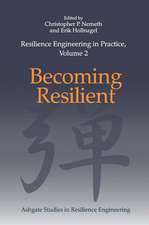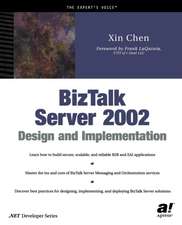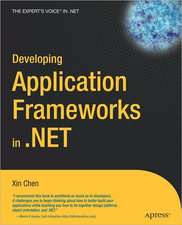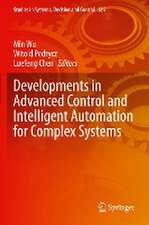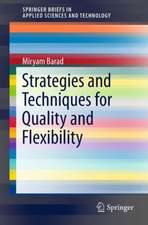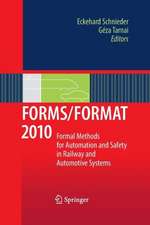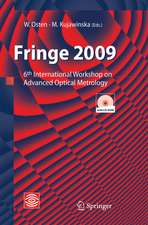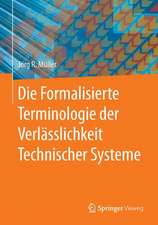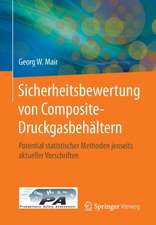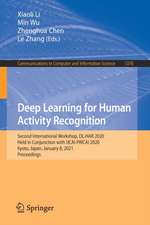Intelligent Optimization and Control of Complex Metallurgical Processes: Engineering Applications of Computational Methods, cartea 3
Autor Min Wu, Weihua Cao, Xin Chen, Jinhua Sheen Limba Engleză Paperback – 18 noi 2020
| Toate formatele și edițiile | Preț | Express |
|---|---|---|
| Paperback (1) | 1107.73 lei 6-8 săpt. | |
| Springer Nature Singapore – 18 noi 2020 | 1107.73 lei 6-8 săpt. | |
| Hardback (1) | 1113.89 lei 6-8 săpt. | |
| Springer Nature Singapore – 18 noi 2019 | 1113.89 lei 6-8 săpt. |
Din seria Engineering Applications of Computational Methods
- 20%
 Preț: 880.62 lei
Preț: 880.62 lei - 24%
 Preț: 898.55 lei
Preț: 898.55 lei -
 Preț: 286.28 lei
Preț: 286.28 lei - 20%
 Preț: 937.16 lei
Preț: 937.16 lei - 18%
 Preț: 790.28 lei
Preț: 790.28 lei - 18%
 Preț: 896.08 lei
Preț: 896.08 lei - 18%
 Preț: 897.81 lei
Preț: 897.81 lei - 15%
 Preț: 638.57 lei
Preț: 638.57 lei - 18%
 Preț: 732.70 lei
Preț: 732.70 lei - 18%
 Preț: 1004.19 lei
Preț: 1004.19 lei - 24%
 Preț: 928.85 lei
Preț: 928.85 lei - 18%
 Preț: 1009.54 lei
Preț: 1009.54 lei - 18%
 Preț: 889.60 lei
Preț: 889.60 lei - 18%
 Preț: 959.36 lei
Preț: 959.36 lei - 18%
 Preț: 939.46 lei
Preț: 939.46 lei - 20%
 Preț: 1153.97 lei
Preț: 1153.97 lei - 18%
 Preț: 736.32 lei
Preț: 736.32 lei - 18%
 Preț: 941.68 lei
Preț: 941.68 lei - 15%
 Preț: 634.00 lei
Preț: 634.00 lei - 15%
 Preț: 633.02 lei
Preț: 633.02 lei
Preț: 1107.73 lei
Preț vechi: 1350.89 lei
-18% Nou
Puncte Express: 1662
Preț estimativ în valută:
211.99€ • 230.19$ • 178.07£
211.99€ • 230.19$ • 178.07£
Carte tipărită la comandă
Livrare economică 22 aprilie-06 mai
Preluare comenzi: 021 569.72.76
Specificații
ISBN-13: 9789811511479
ISBN-10: 9811511470
Pagini: 274
Ilustrații: XVIII, 274 p. 125 illus., 10 illus. in color.
Dimensiuni: 155 x 235 mm
Greutate: 0.41 kg
Ediția:1st ed. 2020
Editura: Springer Nature Singapore
Colecția Springer
Seria Engineering Applications of Computational Methods
Locul publicării:Singapore, Singapore
ISBN-10: 9811511470
Pagini: 274
Ilustrații: XVIII, 274 p. 125 illus., 10 illus. in color.
Dimensiuni: 155 x 235 mm
Greutate: 0.41 kg
Ediția:1st ed. 2020
Editura: Springer Nature Singapore
Colecția Springer
Seria Engineering Applications of Computational Methods
Locul publicării:Singapore, Singapore
Cuprins
Introduction.- Intelligent Optimization and Control of Raw Material Proportioning Processes.- Intelligent Optimization and Control of Coking Process.- Intelligent Control of Thermal State Parameters in Sintering Process.- Intelligent Decoupling Control of Gas Collection and Mixing-and-Pressurization Processes.- Intelligent Optimization and Control for Reheating Furnace.
Notă biografică
Min Wu received his B.S. and M.S. degrees in engineering from Central South University, Changsha, China, in 1983 and 1986, respectively, and his Ph.D. degree in engineering from the Tokyo Institute of Technology, Tokyo, Japan, in 1999.
He was a faculty member of the School of Information Science and Engineering at Central South University from 1986 to 2014 and was promoted to professor in 1994. In 2014, he moved to China University of Geosciences, Wuhan, China, where he is a professor in the School of Automation. He was a visiting scholar with the Department of Electrical Engineering, Tohoku University, Sendai, Japan, from 1989 to 1990, and a visiting research scholar with the Department of Control and Systems Engineering, Tokyo Institute of Technology, from 1996 to 1999. He was a visiting professor at the School of Mechanical, Materials, Manufacturing Engineering and Management, University of Nottingham, Nottingham, UK, from 2001 to 2002. His current research interestsinclude process control, robust control, and intelligent systems.
Prof. Wu has published 6 monographs and more than 260 SCI-indexed papers. He has been included in the list of Thomson Reuters Highly Cited Researchers from 2014 to 2016. Due to his contributions on control theory and its engineering applications, he received numerous honors including the IFAC Control Engineering Practice Prize Paper Award in 1999 (jointly with M. Nakano and J. She), the second-class prize of China’s National Natural Science Award in 2014, the second-class prize of China’s National Science and Technology Progress Award in 2004, and the Academic Contribution Award of Chinese Process Control in 2009.
Prof. Wu is a Fellow of IEEE, Vice-President of the Technical Committee on Control Theory, China Association of Automation, and an active member of the Technical Committee on Process Control, China Association of Automation. Moreover, he served as an Associate Editor of the editorial board of ControlEngineering Practice, Information Sciences, International Journal of Automation and Computing, Control Theory and Applications, and Information and Control.
Weihua Cao received the B.S., M.S., and Ph.D. degrees in engineering from Central South University, Changsha, China, in 1994, 1997, and 2007, respectively.
He was a faculty member of the School of Information Science and Engineering at Central South University from 1997 to 2014 and was promoted to professor in 2009. In 2014, he moved to China University of Geosciences, Wuhan, China, where he is a professor in the School of Automation. He was a visiting student in the Department of Engineering, Kanazawa University, Japan, from 1996 to 1997, and was a visiting scholar in the Department of Electrical and Computer Engineering, University of Alberta , Canada, during the 2007–2008 academic year. His research interests include process control, robots, and intelligent systems. He is a member of the Chinese Association of Automation and a member of the Chinese Association for Artificial Intelligence.
Xin Chen received the B.S. and M.S. degrees in engineering from Central South University, Changsha, China, in 1999 and 2002, respectively, and the Ph.D. degree in engineering from University of Macau, China, in 2007.
He was a faculty member of the School of Information Science and Engineering at Central South University from 1999 to 2014. In 2011, he finished his postdoctoral research of control science and engineering at Central South University. In 2014, he moved to the China University of Geosciences, Wuhan, China, where he is currently a professor with the School of Automation. His research interests include intelligent control, process control, multi-agent systems, and robotics.
Jinhua She received his B.S. degree in engineering from Central South University, Changsha, China, in 1983, and his M.S. and Ph.D. degrees in engineering from Tokyo Institute of Technology, Tokyo, Japan in 1990 and 1993, respectively. In 1993, he joined the School of Engineering, Tokyo University of Technology, Tokyo, where he is currently a professor. His research interests include control theory and applications, repetitive control, process control, Internet-based engineering education, and rehabilitation support devices.
Dr. She is a member of the Society of Instrument and Control Engineers (SICE), the Institute of Electrical Engineers of Japan (IEEJ), the Japan Society of Mechanical Engineers (JSME), Architectural Institute of Japan (AIJ), the Asian Control Association (ACA), and the Institute of Electrical and Electronics Engineers (IEEE). He was the recipient of the International Federation of Automatic Control (IFAC) Control Engineering Practice Prize Paper Award in 1999 (jointly with M. Wu and M. Nakano).
He was a faculty member of the School of Information Science and Engineering at Central South University from 1986 to 2014 and was promoted to professor in 1994. In 2014, he moved to China University of Geosciences, Wuhan, China, where he is a professor in the School of Automation. He was a visiting scholar with the Department of Electrical Engineering, Tohoku University, Sendai, Japan, from 1989 to 1990, and a visiting research scholar with the Department of Control and Systems Engineering, Tokyo Institute of Technology, from 1996 to 1999. He was a visiting professor at the School of Mechanical, Materials, Manufacturing Engineering and Management, University of Nottingham, Nottingham, UK, from 2001 to 2002. His current research interestsinclude process control, robust control, and intelligent systems.
Prof. Wu has published 6 monographs and more than 260 SCI-indexed papers. He has been included in the list of Thomson Reuters Highly Cited Researchers from 2014 to 2016. Due to his contributions on control theory and its engineering applications, he received numerous honors including the IFAC Control Engineering Practice Prize Paper Award in 1999 (jointly with M. Nakano and J. She), the second-class prize of China’s National Natural Science Award in 2014, the second-class prize of China’s National Science and Technology Progress Award in 2004, and the Academic Contribution Award of Chinese Process Control in 2009.
Prof. Wu is a Fellow of IEEE, Vice-President of the Technical Committee on Control Theory, China Association of Automation, and an active member of the Technical Committee on Process Control, China Association of Automation. Moreover, he served as an Associate Editor of the editorial board of ControlEngineering Practice, Information Sciences, International Journal of Automation and Computing, Control Theory and Applications, and Information and Control.
Weihua Cao received the B.S., M.S., and Ph.D. degrees in engineering from Central South University, Changsha, China, in 1994, 1997, and 2007, respectively.
He was a faculty member of the School of Information Science and Engineering at Central South University from 1997 to 2014 and was promoted to professor in 2009. In 2014, he moved to China University of Geosciences, Wuhan, China, where he is a professor in the School of Automation. He was a visiting student in the Department of Engineering, Kanazawa University, Japan, from 1996 to 1997, and was a visiting scholar in the Department of Electrical and Computer Engineering, University of Alberta , Canada, during the 2007–2008 academic year. His research interests include process control, robots, and intelligent systems. He is a member of the Chinese Association of Automation and a member of the Chinese Association for Artificial Intelligence.
Xin Chen received the B.S. and M.S. degrees in engineering from Central South University, Changsha, China, in 1999 and 2002, respectively, and the Ph.D. degree in engineering from University of Macau, China, in 2007.
He was a faculty member of the School of Information Science and Engineering at Central South University from 1999 to 2014. In 2011, he finished his postdoctoral research of control science and engineering at Central South University. In 2014, he moved to the China University of Geosciences, Wuhan, China, where he is currently a professor with the School of Automation. His research interests include intelligent control, process control, multi-agent systems, and robotics.
Jinhua She received his B.S. degree in engineering from Central South University, Changsha, China, in 1983, and his M.S. and Ph.D. degrees in engineering from Tokyo Institute of Technology, Tokyo, Japan in 1990 and 1993, respectively. In 1993, he joined the School of Engineering, Tokyo University of Technology, Tokyo, where he is currently a professor. His research interests include control theory and applications, repetitive control, process control, Internet-based engineering education, and rehabilitation support devices.
Dr. She is a member of the Society of Instrument and Control Engineers (SICE), the Institute of Electrical Engineers of Japan (IEEJ), the Japan Society of Mechanical Engineers (JSME), Architectural Institute of Japan (AIJ), the Asian Control Association (ACA), and the Institute of Electrical and Electronics Engineers (IEEE). He was the recipient of the International Federation of Automatic Control (IFAC) Control Engineering Practice Prize Paper Award in 1999 (jointly with M. Wu and M. Nakano).
Textul de pe ultima copertă
This book discusses the intelligent optimization and control of complex metallurgical processes, including intelligent optimization and control of raw-material proportioning processes, coking process, and reheating furnaces; intelligent control of thermal state parameters in sintering processes; and intelligent decoupling control of gas collection and mixing-and-pressurization processes. The intelligent control and optimization methods presented were originally applied to complex metallurgical processes by the authors, and their effectiveness and their advantages have been theoretically proven and demonstrated practically. This book offers an up-to-date overview of this active research area, and provides readers with state-of-the-art methods for the control of complex metallurgical processes.
Caracteristici
Provides up-to-date overview and state-of-the-art methods for the control of complex metallurgical processes Presents a series of methods for the modeling, optimization and control of production processes in real time Describes methods that have been proven effective and which offer advantages over other methods

